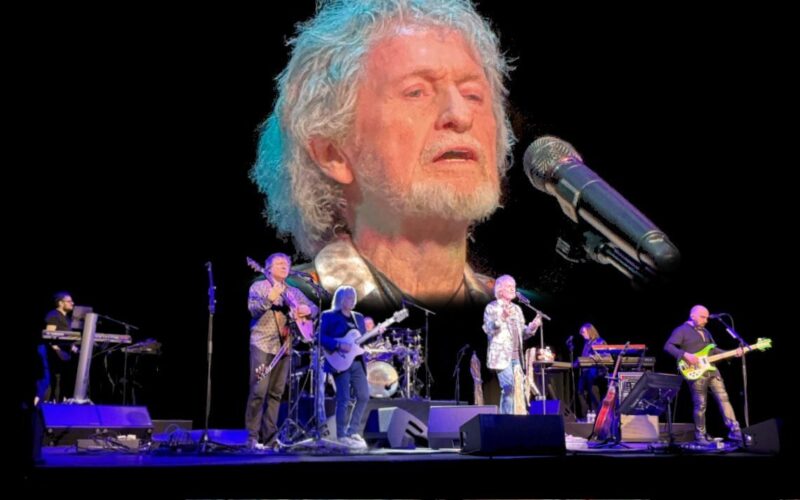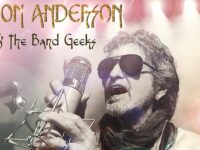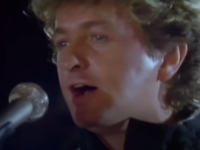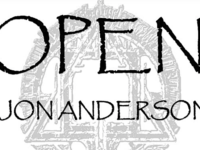
Moore Theater, Seattle: This was my first time attending a concert for Jon Anderson and the Band Geeks. It was their second tour, but their first time in the Pacific Northwest.
Before I get to the show highlighted here, I believe some personal background is in order. I became a ferocious Yes fan after I first heard “Roundabout” when it was released in 1972. (More about my Yes fandom can be found in my liner notes for 2005’s The Word Is Live.) As Yes aficionados know, I was instrumental in bringing that band to the internet, first through direct association with them through the online journal Notes From the Edge and followed by creating and managing their official website.
Yes fans were ravenous for official news: they not only wanted to be kept abreast of what Yes was up to, they were just as interested in the activities of former band members. I addressed that need by creating the schema for what became YesWorld, which included two sections: one for official Yes data directly from the band, and a second that was titled YesNet for anything else, including official websites that existed for past members (e.g., Bill Bruford).
To say my relationship with Yes is complicated is a bit of an understatement. I parted ways with them at a time when they were going through major upheavals. (My departure was fairly contentious, and I intend on covering that and my other Yes-related experiences in the future.) I was in good company as other folks who were coldly severed from Yes at around the same time included Oliver Wakeman, Benoit David, and … Yes co-founder Jon Anderson.
Benoit David assumed Yes’ lead vocal duties with the official statement poising him as an “understudy” while Anderson was recuperating from an illness that prevented him from touring. That narrative was disingenuous: After Anderson regained his health, there would be no reunion. As far as the remaining members (Steve Howe, Chris Squire and Alan White) were concerned, they were done with Anderson. Not long afterward Yes’ co-founding member Squire died in 2014 at age 67 due to an illness, leaving Yes with no original members, and – debatably – with no heart.
Prior to Squire’s death, I lost interest in Yes’ output after Jon Davison of Glass Hammer was recruited to take over lead vocals. Davison would also have a strong presence in crafting new pieces. I found the Yes albums that followed were unsatisfactory on many different fronts, but the biggest problem was that the music lacked whatever grace, gravitas and songwriting acumen Anderson had brought to their Yes for so many years.
In the end, what makes or breaks any artist is the material, and in my case none of it clicked. I truly wanted to have new Yes music to enjoy, and I wasn’t explicitly “no Jon no Yes.” But for me, it was no coincidence that without Anderson present to craft and shepherd new Yes compositions, there was very little I found melodic, catchy or even memorable. Those tenets were all hallmarks of Yes’ music with Anderson’s involvement. Chief among these was one major attribute that bears repeating: heart.
After Anderson was fired, he continued to create albums and tour on his own. These included solo outings (literally, with no backup players), a duo tour with Rick Wakeman, collaborations with young players (including the Paul Green Rock Academy), and one memorable tour with Wakeman and Trevor Rabin as “Yes Featuring ARW.” That last partnership unfortunately fell apart before a proposed recorded project. Throughout this challenging era, Anderson’s wife Jane most likely kept his positive spirit elevated above a proverbial dark cloud.
Throughout that period, Anderson made attempts for a reconciliation with Yes proper, primarily alongside Steve Howe. The two had enjoyed a satisfying songwriting alliance that resulted in some of Yes’ classic pieces. Howe said he wanted to instead “go forward,” which meant doing so without Jon Anderson.
Fortunately, Anderson found a way to do the same when he became aware of a video of the Band Geeks effortlessly performing “Close to the Edge.” Richie Castellano, their leader and bassist, was a seasoned professional who had recorded and toured as a member of Blue Oyster Cult for well over a decade (and continues to do so today). Castellano formed the Band Geeks as a way to find the best and most collaborative players, rotating roles within the band until he felt he hit the jackpot. His goal was to be able to play complex cover songs of choice that were sonically accurate and technically precise, including pieces from Yes – and all just for fun, initially at least.
Anderson first reached out to Castellano while backstage at a show in 2019 and suggested they work together, but COVID thwarted that plan in the short term. After Castellano mentioned Anderson’s offer to a friend in 2021, he took said friend’s advice and contacted Anderson, ultimately leading to Jon Anderson and the Band Geeks mounting two tours and recording their first collaborative album, 2024’s True.
While I had seen the update of “Close to the Edge” video years ago (and recall thinking they would be a good fit for Anderson), I was a bit apprehensive about this new venture when it came to original songs. There were numerous artists who gained fame in the 1970s and in recent years recorded original material, where their subsequent tours barely featured any of those new pieces. (The one huge exception was Rush, who in the current century wholeheartedly presented big chunks of their new albums alongside their back catalog. This indicated to me, at least, that they had confidence performing these new tunes that their peer acts seemed to have lacked.)
Enthusiastic reviews of the shows from both friends and fans greatly piqued my interest. Finally listening to True cinched it. Lo and behold, the material was solid: The songs contained earworms, the instrumentalists were engaging, the arrangements made sense, and everything that I mentioned Anderson brought to Yes was present (including the ‘h’ word). By the time a show was scheduled for the Moore Theater in Seattle, there was no question for either my wife Cindy or myself that we would purchase tickets to hopefully yet jubilantly experience this for ourselves.
On the evening of the show, the venue appeared to be at capacity, which was encouraging. I was happy to see fellow Yes fan friends from years past who were just as excited about attending this performance, and for the same reasons.
The concert began with “The Firebird Suite,” which immediately brought back what it was like to have attended so many Yes shows in the past. The set started with “Close to the Edge,” the one Yes song that holds a great deal of significance for me. Beyond having authored the liner notes for Rhino’s expanded and remastered release — and having written an article about its coda key change that was in place for Yes tours until after the 50th anniversary of the album — this was the first composition that affected me emotionally and taught me a great deal about the importance of the mechanics of a proper songwriting arrangement, particularly when the piece culminated to a stirring climax.
I’m a bit younger than Anderson but we both travelled through the impactful 1960s where we shared influences that included the Beatles and Simon and Garfunkel, and I’ve already indicated the effect he and Yes had on my own life – including my own music. From the very start, it didn’t bother me one bit that official Yes band members weren’t flanking him for this opener, and for the classic tracks that followed. Anderson’s voice, energy and vibe were riveting and provided the focal point, with the Geeks providing top notch support.
The coda (“on the hill, we viewed the silence of the valley”) was performed in the original key, and that made it even more effective and affecting. As I was already swept up, I couldn’t hold back the tears. It brought me back to the first time I recollect sobbing during any rock performance: Yes at the Inglewood Forum for 1978 tour in support of Tormato, where I started crying uncontrollably when I heard the intro to “Future Times/Rejoice.” For that, I have no explanation beyond being caught up in the moment.
Prior to that evening, I made a point of not watching any of the live YouTube videos from Anderson and the Band Geeks. I wanted this show to serve as my first exposure to those same masterworks I had witnessed Yes perform over the decades. I was confident that I would not be disappointed, and I wasn’t. While I was enthralled with the Geeks’ masterful instrumentals and backing vocals, what brought it all together – and brought it home to me – was Anderson. He still had that presence that could paradoxically convey innocence and wisdom, and oh, damn, that voice: I could only marvel at how at age 80 Anderson could sing so strongly and with unwavering assuredness. He hit those high notes effortlessly, and only occasionally could I “hear” his age when he sang. I saw that as more a testament to his longevity than anything remotely akin to an issue.
The entire set list can be found here, so I’ll stick to other high points. “Perpetual Change” is a particular favorite of mine. It’s quintessential Yes and was performed almost flawlessly (more on that below), with its bracing suspended fourth chords that bring you at attention; the melodic call and response chorus; the pastoral instrumental verse with its jazzy guitar solo leading to the frenetic repetitive section which serves to reintroduce the chorus as a counterpoint; and the outro that takes the tune to an entirely different place. This was the kind of piece where the younger players could display their chops and were clearly having fun. They honored and energized the original recording while Anderson’s elfin vocals soared above the proceedings.
One of the new tunes, “Counties and Countries” demonstrated what in general separates great prog from lesser efforts. I was familiar with it but didn’t have it, or the other two new tunes performed, entirely committed to memory but I got carried along throughout, partially due to the memorable choruses. I’ve had this same experience during Steve Hackett’s tours, where I wasn’t as acquainted with the newer material but nevertheless was easily engaged and ultimately satiated.
“And You and I” verified how effective the members had operated throughout the set. While Matt Beck was the primary guitarist on this leg of the tour, he was joined by Rob Schmoll providing the main 12-string ascending/descending figure. Phil Castellano added to the song’s lushness by joining in on the same instrument and would support Christopher Clark on keyboards here, and throughout the set. Bassist Richie Castellano and drummer Andy Ascolese were tight and naturally eclipsed the basic definition of a rhythm section.
The only item that was missing was the harmonica part that Chris Squire would contribute to “The Preacher, the Treacher” movement. This was a rare item where something that didn’t appear in the original recording was added in concert. Perhaps its omission was an appropriate tribute to Squire, and I’m sure I wasn’t the only one who thought of the late bass player during that portion.
“Awaken” is so tied to Anderson’s core being that to my mind, if he’s not leading that tune then it’s a pale imitation. It brought back another memory, this time of when Cindy and I traveled from Toronto to see Yes at Cobo Hall in Detroit for the Going For the One tour in 1977: I was so animated during the “workings of man” part that it caused a nearby security dude to gesture his amusement/amazement to my actions. Though that occurred a long time ago, I was just as excited this evening thanks to the band’s stellar rendition, including Anderson’s performance on his trusty harp.
In ending the show, Anderson did something I wish more artists would emulate: perform the encore (“Roundabout,” of course) without leaving the stage first. The concept of the encore is to cheer the departed band to return, but at rock shows it’s become more of a contrivance than the demand that it should be. Kudos to the band for this.
While this show was memorable, I had a couple of quibbles. The keyboards were at times a bit thin in the mix, specifically at moments where a part was expected to break through. One example was evident during the aforementioned counterpoint appearing during the frenzied section of “Perpetual Change” — the lack of necessary volume thwarted the elevated excitement that it might have otherwise generated. Maybe this was the intent or a quirk of this particular concert, but I found others agreed with noticing its omission.
Throughout the show, the lighting did little more for me than illuminate the stage. Yes was the first band I had seen where the lighting practically functioned as another instrument, vigorously changing in time with the music. (This influenced me to become a lighting director in Toronto.) At this concert, I would have preferred a broader color palette with more dynamic scenes, something I had come to expect after experiencing those aspects at numerous Yes shows.
It would have been gratifying to have heard even an inkling of Anderson’s solo catalog. The goal here seems to be presenting legacy Yes material where Anderson was present, including the Trevor Rabin era. The idea of the combo fleshing out a mini-suite from Olias of Sunhillow might not be of interest to the casual Yes fan, but it would be thrilling for those of us who have faithfully followed Anderson’s career. In the future, I hope Anderson and the Geeks will throw us a bone like “All In a Matter of Time,” which I believe wouldn’t take any matter of time at all to pull together.
While I’m at it, Yes pieces I hope they’ll attempt include “The Remembering.” Beyond being one of the most dynamic, expansive and affecting longer pieces in the Yes catalog, it’s one number I had never experienced in concert as they had dropped it before the two Los Angeles area shows for the Tales From Topographic Oceans tour I had attended in 1973. I also hope they would add a piece from Tormato that Yes seldom played, the raucous “Release, Release,” issued at the dawn of punk. That movement was a reaction to another fraught political time and the rocker’s lyrics are more relevant than ever today: “further the right of all of creation.” And while technically not Yes in name, how wonderful it would be for Jon and the Geeks to perform Anderson Bruford Wakeman Howe’s “Brother of Mine”: “So, give it all the love you have … there is a special reason … this time.” A special reason, indeed.
Considering what Jon Anderson and the Band Geeks have achieved to date for me and for a great many others, whether they accept my suggestions or not is minor. After Anderson’s exit from Yes, I thought I would never again experience the same joy that band had brought to me in the past. At this show, I was happy to be proved wrong and hope I will experience many more.
Very happy to “meet” you, Band Geeks. And Jon, “long lost brother of mine,” though as an artist you never really went away, welcome back to your own true Yes.
Thanks to superfan and longtime friend Dian Lau for filling me in.
© 2025 Mike Tiano. All Rights Reserved.
- Jon Anderson & the Band Geeks, April 14, 2025: Shows I’ll Never Forget - June 13, 2025
- Remembering Billy James: ‘He Was One of the Good Ones’ - May 15, 2025
- ‘Becoming Led Zeppelin’ (2025): Movie Review - March 11, 2025




